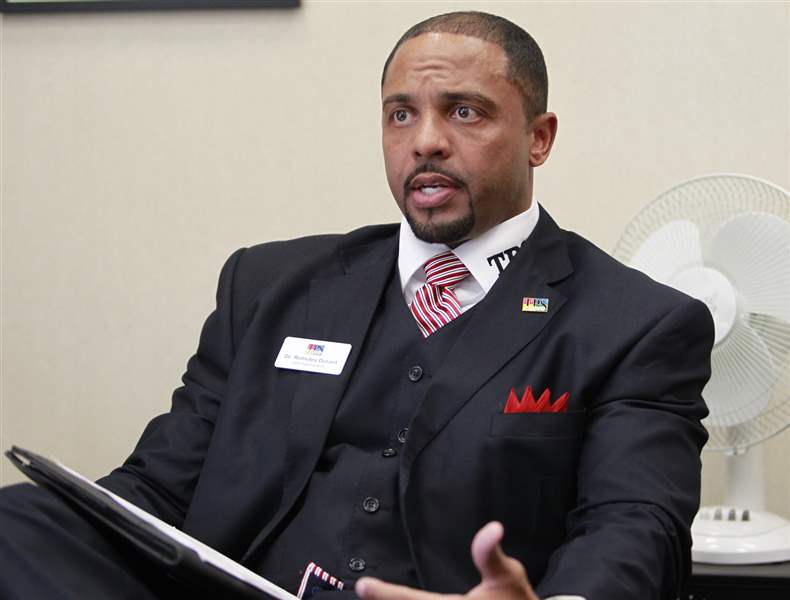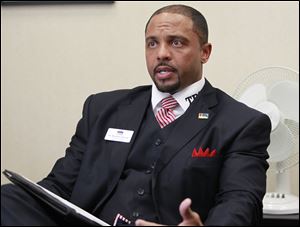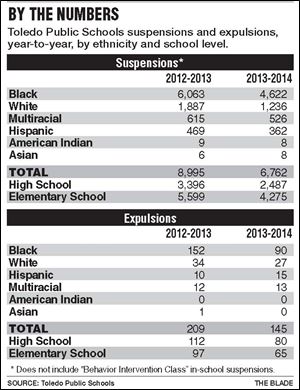
TPS reduces suspensions, expulsions in 2013-14 year
8/22/2014
TPS Superintendent Romules Durant said schools plan to reward positive behavior.
The Blade
Buy This Image

TPS Superintendent Romules Durant said schools plan to reward positive behavior.
A nearly one-quarter decline in the number of student suspensions during the 2013-14 school year and an even greater drop in expulsions are evidence the Toledo Public Schools’ effort to change how the district deals with behavioral problems is working, officials said Thursday.
The Toledo schools’ shift to K-8 community schools in place of separate-level elementary and middle schools also has contributed, as has the district’s emphasis on mainstreaming special education students, Jim Gault, a transformational leader at TPS’ central office, said after the statistics were released Thursday.
Districtwide, out-of-school suspensions declined 24.8 percent, to 6,762 last school year from 8,995 in 2012-13, according to the TPS report. In-school “behavior intervention class” suspensions were down 28 percent, to 4,260 from 5,970, and expulsions — which last from 11 days to an entire 180-day school year — dropped by 30.6 percent, to 145 from 209.
The biggest decline was in the number of expulsion days, reporting the aggregate time expelled students were out of school.
Expulsion days fell districtwide from 5,125 in 2012-13 to 3,135 last school year, a 38.8 percent decline, and by nearly half among elementary school students.
“We’re seeing some very good progress here,” Mr. Gault said.

The community-schools model, he said, has increased parental involvement, which reduces student behavioral incidents, and the piloting of the Positive Behavior Interventions and Supports approach in 15 schools is proving successful.
The latter, under which school administrators strive to reinforce positive behavior and discourage misbehavior pro-actively rather than just reacting with punishment, will be expanded to the 25 other TPS elementary schools “within two to three years,” Superintendent of Schools Romules Durant said.
The Rev. James H. Willis, Sr., pastor of St. Paul Baptist Church and co-president of Toledoans United for Social Action, said establishing positive discipline in the elementary schools leads to better behavior in the high schools as students advance.
“[Toledoans United for Social Action] is very proud of the progress that has been made,” Pastor Willis said. “This is information we can share with our congregations. Everybody’s concerned about the children — that’s the bottom line.”
Keary Sarabia, vice president of operations for TACKLE, which provides mental health, substance abuse, and related guidance services to Toledo Public students, said his agency’s staff are present in the schools to provide interventions and assistance with behavioral issues and family problems.
“A lot of our kids come from dysfunctional family backgrounds,” Mr. Sarabia said. “We want our kids to understand that everyone has issues to overcome to become successful.”
“We’re committed to building strong relationships with the community,” Mr. Durant said. “These are the collective results of collective action. … There’s room for growth, and we’re going to continue with that.”
The sixth through eighth grades had been the biggest problem, the superintendent said, and switching to the K-8 model has helped by keeping many students in familiar settings — with teachers and administrators they have known, and who have known them, for years at a crucial time in their growth.
This year, Mr. Durant said, TPS is placing new emphasis on high school freshmen, starting with having the first day of classes be for freshman orientation only.
Freshman class schedules will include an “advisory period” focused on study skills, career planning, and relationship building, he said, while teachers in core subjects will have a common planning period they can use to collaborate with each other or meet with parents.
Marcia Dinkins, Toledoans United for Social Action’s executive director and lead organizer, said many other districts are only “just becoming cognizant” of the approach TPS is taking to student discipline, which could become a model.
Stubbornly high, despite the overall decline in suspensions and expulsions last school year, is the disproportionate rate at which black students are punished compared with their representation in the district’s total student body.
Last school year, blacks accounted for 90 of 145 expulsions — 62 percent — and 4,622 of 6,762 out-of-school suspensions — 68 percent — despite comprising 40.8 percent of TPS enrollment.
White students, the district’s second largest racial group at 40 percent, were suspended 1,236 times during the school year and expelled 27 times — still less than one-third the numbers of their black counterparts despite the district’s changing disciplinary approach.
Mr. Gault said the Positive Behavior Interventions and Supports initiative has started with schools that had high rates of disciplinary action — and high-percentage minority populations — and its goal is to eliminate any disparity in suspensions or expulsions that could be traced to race or gender.
While the ideal would be to never suspend or expel students, such actions must be taken in cases of violence or other severe misbehavior, he said.
Mr. Gault said he had no breakdown for the types of behavior that resulted in suspensions or expulsions.
Contact David Patch at: dpatch@theblade.com or 419-724-6094.